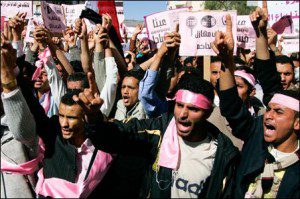31 Jan 2012 | Europe and Central Asia, Index Index, minipost
The offices of an Indian media group have been attacked by a group of right-wing Hindu nationalists in Mumbai. Dozens of supporters of right-wing nationalist group Shiv Sena attacked the building Times of India on Saturday, protesting against a local newspaper’s coverage of their internal politics. The article, which ran in the Maharashtra Times, a Marathi-language daily that is part of the news group, said Sena politician Anandrao Adsul was going to change allegiances and join the rival National Congress Party (NCP). Seventeen Sena activists were arrested, following the attack.
27 Jan 2012 | Middle East and North Africa
When Index on Censorship visited Bahrain on a fact finding mission late last year, officials repeatedly pledged to maintain a transparent relationship with the international community. Now that undertaking seems just another broken promise. Three international rights organisations have been denied entry this year.
The fact-finding mission investigated the state of free expression in Bahrain. We detailed our findings in a report released this week. In meetings with officials from the Ministry of Human Rights, the mission was promised that as long as the correct procedures were followed, we (and other organisations) would be allowed to enter Bahrain.
Earlier this month Bahrain refused to grant the visas to staff from Physicians for Human Rights and Human Rights First, asking that they delay until March. Despite having visas and a scheduled meeting with the US Embassy, a delegation from Freedom House was barred from entering the country on 19 January, only days before they planned to travel. Authorities asked that the organisation delay their trip until the end of February.
“I was very disappointed that I was unable to go”, Freedom House’s Courtney Radsch told Index. According to Freedom House, the mission’s was not related to political unrest in the county but part of a programme monitoring the empowerment of rural women started in 2010. Radsch said that the decision showed the “complete hypocrisy” of officials. In a blog post, Radsch quoted King Hamad assuring the international community that they would have any open door, saying “any government which has a sincere desire for reform and progress understands the benefit of objective and constructive criticism.”
A violent crackdown on daily protests continues, and despite the BICI committee’s recommendation that prisoners be released or employees be reinstated, many Bahrainis have been unable to resume their daily lives. Even the chair of the BICI commission, Cherif Bassiouni, who previously commended the King for commissioning the report, said that critics would be justified in calling Bahrain’s sluggish implementation of their recommendations a “whitewash“.
Meanwhile, members of the opposition are growing restless, and this week things took a bloody turn. Violence escalated between protesters and security forces Wednesday, as some younger opposition members attacked police officers. Wednesday’s violence reportedly resulted in four deaths, including that of Mohamed Yacqoub, 18. While human rights activists Index spoke to were insistent on peaceful protest methods, they warned of things taking a more violent turn if brutality against peaceful protesters were to continue after the release of the BICI report.
27 Jan 2012 | News
 After a year of political unrest following the Arab Spring, Iona Craig reports on the current situation in Yemen.
After a year of political unrest following the Arab Spring, Iona Craig reports on the current situation in Yemen.
(more…)
25 Jan 2012 | Middle East and North Africa
Stateless protesters face deportation after demonstrations in Kuwait demanding citizenship turned violent. Kuwaiti authorities revealed that as a punishment, the stateless “Bedoon” population, those without passports, would be forced out of the country. Authorities also warned that any Bedoon from the army and police force would be dismissed if they or their children attended the protests, and those involved in the protests would be evicted from any state housing.
There are at least 120,000 Bedoon jinsiyya (without nationality) in Kuwait denied the right to obtain birth, death, marriage or divorce certificates. They have no access to public education, health care, housing or employment.
Kuwait’s Interior ministry faced down the protests with tear gas, smoke bombs, water cannons, bats, humiliation, harassment, arrests and trials. Back in February and March 2011, around 5000 stateless protested in isolated areas of Taimaa, Sulaibiya, and Ahmady for their rights to documents, education, health care, employment, and most importantly naturalisation. Over 100 men were sent to trial for ‘illegal protesting’, ‘disobedience of police orders’, and ‘violence against policemen.’
In December the protests began again and every Friday, Kuwait’s police repressed them more and more violently. Kuwait University professor Dr Ebtehal Al-Khatib and other members of the Kuwaiti association of Human Rights reported the terror they witnessed in Taimaa. A video of a stateless woman being beaten by a riot policeman enraged the Bedoon even further. According to Kuwaiti newspaper Al-Rai, around 108 protesters were arrested on 13 January. They are still in detention as the prosecution keeps delaying their release.
Kuwaiti authorities justified the oppression saying the protests were not “authorised”. Some stateless activists tried to get permission to demonstrate but their requests were rejected. The Interior Ministry has repeatedly stated that only citizens are allowed to protest. It also claims that the brutality demonstrated by riot police was merely a response to violence by protesters.
Several Kuwaiti activists condemned the threats of deportation. Academic Dr Ghanim Al-Najjar suggested these threats were not serious, but were made up to frighten protesters.
Unconfirmed reports by stateless activists indicate that detained protesters were mistreated and beaten in prison. For over a week after Fridy 13 January, Taimaa and Sulaibiya areas — where large numbers of Bedoon live — were under siege by riot police.
Activists such as Nawaf Al-Bader and Mousaed Al-Shammari have reported on Twitter how policemen set checkpoints questioning drivers in an attempt to stop people joining ptotests.
Mona Kareem is a stateless poet, journalist, and a blogger at monakareem.blogspot.com

